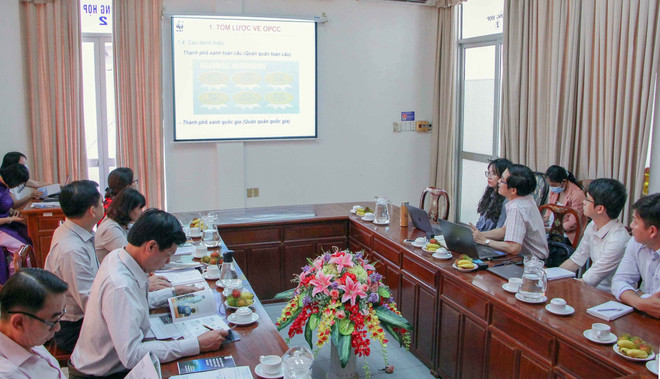 A view of the meeting between the World Wide Fund for Nature (WWF) and leaders of the Mekong Delta's Can Tho city on April 28. (Photo: VNA)
A view of the meeting between the World Wide Fund for Nature (WWF) and leaders of the Mekong Delta's Can Tho city on April 28. (Photo: VNA)The statement was made by Chairman of the municipal People’s CommitteeDuong Tan Hien during a meeting with WWF representatives in the city on April28.
The OPCC was initiated by the WWF to mobilise action and support fromcities in the global transition towards a climate-friendly future and to promotemeasures for climate change mitigation and adaptation.
It first began in Sweden in 2011 and expanded globally in 2013, accordingto Tran Anh Tuan, technical advisor with the OPCC. Since 2017, it has been heldtwice a year on an increasingly larger scale, and more than 320 cities from 20countries have joined in to date.
Via the challenge, he said, cities share smart, efficient solutions forlow-carbon and climate-resilient urban development and drive the globaltransition towards a 100-percent renewable energy future.
More than half of the world’s population live in cities that are seeingrapid urbanisation, Tuan continued. They generate over 80 percent of global GDPbut also contribute 70 percent of global greenhouse gas (GHG) emissions. Aspolitical and business hubs, cities should play a decisive role in mitigatingclimate change, he said.
A number of central cities in Vietnam have participated in the OPCCsince 2015, including Hue, Da Nang, Hoi An, Dong Ha, Dong Hoi, and Vinh. In 2020-2021,two more - Can Tho and Soc Trang - are expected to join.
As a first-class municipality, Can Tho faces many of the same problemsother cities are confronting in their development process, Hien said. It hastaken part in several programmes and networks, such as The RockefellerFoundation’s 100 Resilient Cities, in an effort to minimise the negativeimpacts of climate change in each area.
He pledged that Can Tho will fulfil all of its commitments and adopteffective measures to make itself a greener and more modern city when joiningthe OPCC.
In 2018, Da Nang was awarded the title National Capital of the OPCC,making it the only city in Vietnam to join a list of 21 winning cities aroundthe world./.





























